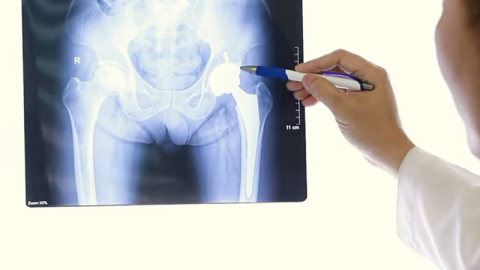Opioid analgesics are among the common drugs used in the treatment of acute and chronic pain. With their powerful pain-relieving abilities, opioids have played an important role in improving the quality of life of millions of people worldwide.
In this article, SignsSymptomsList will answer questions surrounding the opioid pain medication class. The article will introduce the definition and uses of opioids, and also provide important notes when using this class of drugs. Let's follow the article to better understand about opioid pain relievers!
What are opioid pain relievers?
Opioids are a class of drugs that act on the nervous system and are used to relieve pain and other effects. They can be prescribed by your doctor to treat mild to severe pain. However, it should be noted that opioids can also cause unwanted side effects and the risk of addiction.
Opioid analgesics act on the nervous system to relieve pain
The mechanism of action of opioids is through blocking pain signals between the brain and the body, thereby reducing the sensation of pain. In addition to pain control, some people taking opioids may experience feelings of comfort, joy, or lightheadedness. However, these effects are not the main goal of drug use and can be harmful to health.
Prescription opioid medications include oxycontin and vicodin. In addition, in the opioid group there are fentanyl and heroin. Fentanyl is a synthetic opiate that is 50 to 100 times stronger than morphine and is used in some special cases. Meanwhile, heroin is a drug .
Effects of opioid pain relievers
Opioid medications are considered one of the most effective pain treatments. It may be prescribed for pain relief in some of the following situations:
Treatment of severe pain
Opioids are widely used to relieve pain in cases such as after major surgery, serious trauma or during the treatment of acute medical conditions. With their powerful and rapid pain relief, opioids help patients tolerating and feeling better.
Chronic cancer pain
People with cancer pain, especially chronic pain, are often prescribed opioids to relieve pain and improve quality of life. Cancer pain is often very severe and has a strong impact on a patient's physical and psychological well-being. In this case, opioid drugs can provide pain relief and enable the patient to live a better life.
Opioid pain relievers are used to relieve chronic pain from cancer
Chronic pain not caused by cancer
In addition to cancer pain, opioid medications can also be used to relieve pain in situations where chronic pain is not related to cancer, such as chronic back pain, neuropathic pain, or medical conditions. osteoarthritis. For people living with chronic pain, opioid medications can be an important way to manage pain and improve quality of life.
Side effects of opioid pain relievers
Along with being effective in treating pain, opioid medications can also cause some side effects. Here are some common side effects that can occur with opioid pain relievers:
- Constipation : Constipation is a common side effect of opioid use. To relieve constipation, users need to drink enough water, increase the supply of fiber in the diet and exercise appropriately.
- Nausea: Nausea may occur for the first few days after starting opioid medication. If this condition persists or causes discomfort, users should contact their doctor for advice on anti-nausea therapy .
- Sedation, drowsiness, or distraction: Some people using opioid medications may experience sedation, drowsiness, or loss of concentration. This is a side effect that usually occurs in the first few days after taking the drug or after increasing the dose. If symptoms become severe or make it difficult to perform daily activities, notify your doctor.
- Slow breathing: Opioids can slow breathing, especially when used in high doses. Usually the condition goes away on its own after the body adapts to the medication.
- Painkiller Addiction: It should be noted that only a small percentage of opioid users become addicted to the drug. However, with long-term use of opioid drugs, the odds of addiction increase. Therefore, it is extremely important to use the drug according to the correct dosage and prescribed by the doctor for the right treatment.
Opioids can cause nausea
How to reduce the side effects of opioids?
To avoid or lessen the side effects of opioids, there are steps you can take. Some suggestions below:
- Take medicine exactly as prescribed and directed by your doctor: It is very important to adhere to the correct dose and schedule of medication prescribed by your doctor. This helps ensure safety and effectiveness during treatment.
- Tell your doctor about pain: If you still feel pain after taking an opioid, tell your doctor right away. Do not increase your dose or use more medicine without the guidance of a medical professional.
- Watch for signs of side effects: Be alert and observe your body for signs of possible side effects after using the drug. For example, excessive sleepiness or feeling that you need to take more medicine than usual. If you see these signs, notify your doctor for advice and monitor your health condition more closely.
Can opioids be taken with other medicines?
Before taking an opioid with any other medication, it is important to tell your doctor about all the medications you are taking, are taking, or will be taking. In particular, it should be informed if you are taking any medication for anxiety disorders , sleep problems or seizures. In addition, even infrequently used drugs can interact with opioid pain relievers.
To limit the level of side effects after using the drug, it is necessary to contact a doctor for careful advice and safety.

Talk to your doctor about taking other medications while you're on opioids
How to store opioids?
For families with young children, it is very important to prepare a locked medicine cabinet to store medicines.
One thing to keep in mind is that even an adult-appropriate dose of an opioid pain reliever can be dangerous and fatal in young children.
Moreover, the storage of medicines needs to be done carefully, because there may be guests or children in the house who use the medicine without the purpose of treatment.
In summary, for pain relief, opioid analgesics are an effective option. However, this medicine should be used with caution to avoid risks such as overdose or improper use. Therefore, before using the drug, the patient should have a basic knowledge of opioid-containing drugs. If you have any questions, consult your doctor for advice and indications for the correct, safe and effective use of the drug.









